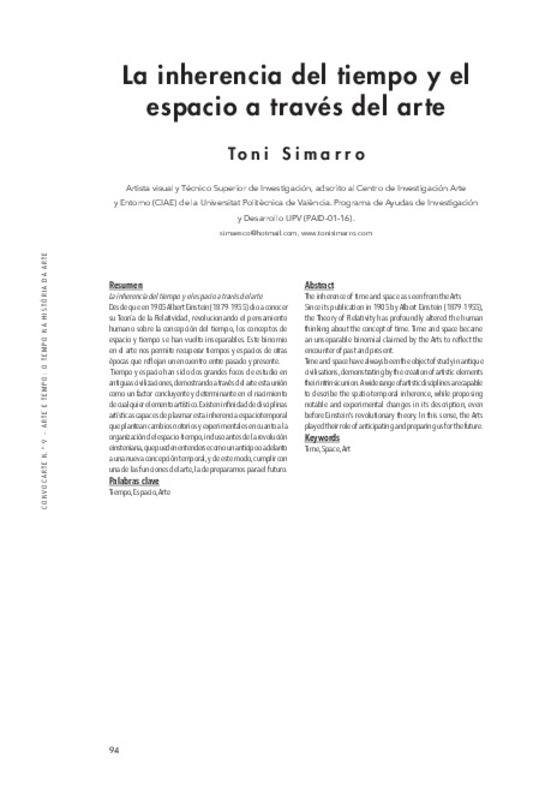JavaScript is disabled for your browser. Some features of this site may not work without it.
Buscar en RiuNet
Listar
Mi cuenta
Estadísticas
Ayuda RiuNet
Admin. UPV
La inherencia del tiempo y el espacio a través del arte
Mostrar el registro sencillo del ítem
Ficheros en el ítem
| dc.contributor.author | Simarro-Escobar, Antonio
|
es_ES |
| dc.date.accessioned | 2021-04-23T03:31:03Z | |
| dc.date.available | 2021-04-23T03:31:03Z | |
| dc.date.issued | 2019-12 | es_ES |
| dc.identifier.issn | 2183-6973 | es_ES |
| dc.identifier.uri | http://hdl.handle.net/10251/165514 | |
| dc.description.abstract | [ES] La inherencia del tiempo y el espacio a través del arte Desde que en 1905 Albert Einstein (1879-1955) dio a conocer su Teoría de la Relatividad, revolucionando el pensamiento humano sobre la concepción del tiempo, los conceptos de espacio y tiempo se han vuelto inseparables. Este binomio en el arte nos permite recuperar tiempos y espacios de otras épocas que reflejan un encuentro entre pasado y presente. Tiempo y espacio han sido dos grandes focos de estudio en antiguas civilizaciones, demostrando a través del arte esta unión como un factor concluyente y determinante en el nacimiento de cualquier elemento artístico. Existen infinidad de disciplinas artísticas capaces de plasmar esta inherencia espaciotemporal que plantean cambios notorios y experimentales en cuanto a la organización del espacio-tiempo, incluso antes de la revolución einsteniana, que pueden entenderse como un anticipo o adelanto a una nueva concepción temporal, y de este modo, cumplir con una de las funciones del arte, la de prepararnos para el futuro. | es_ES |
| dc.description.abstract | [EN] The inherence of time and space as seen from the Arts. Since its publication in 1905 by Albert Einstein (1879-1955), the Theory of Relativity has profoundly altered the human thinking about the concept of time. Time and space became an unseparable binomial claimed by the Arts to reflect the encounter of past and present. Time and space have always been the object of study in antique civilisations, demonstrating by the creation of artistic elements their intrinsic union. A wide range of artistic disciplines are capable to describe the spatio-temporal inherence, while proposing notable and experimental changes in its description, even before Einstein¿s revolutionary theory. In this sense, the Arts played their role of anticipating and preparing us for the future. | es_ES |
| dc.language | Español | es_ES |
| dc.publisher | Universidade de Lisboa | es_ES |
| dc.relation.ispartof | Convocarte. Revista de Ciências da Arte | es_ES |
| dc.rights | Reserva de todos los derechos | es_ES |
| dc.subject | Tiempo | es_ES |
| dc.subject | Espacio | es_ES |
| dc.subject | Arte | es_ES |
| dc.subject | Time | es_ES |
| dc.subject | Space | es_ES |
| dc.subject | Art | es_ES |
| dc.subject.classification | DIBUJO | es_ES |
| dc.title | La inherencia del tiempo y el espacio a través del arte | es_ES |
| dc.type | Artículo | es_ES |
| dc.relation.projectID | info:eu-repo/grantAgreement/UPV//PAID-01-16/ | es_ES |
| dc.rights.accessRights | Abierto | es_ES |
| dc.contributor.affiliation | Universitat Politècnica de València. Departamento de Dibujo - Departament de Dibuix | es_ES |
| dc.description.bibliographicCitation | Simarro-Escobar, A. (2019). La inherencia del tiempo y el espacio a través del arte. Convocarte. Revista de Ciências da Arte. (9):94-111. http://hdl.handle.net/10251/165514 | es_ES |
| dc.description.accrualMethod | S | es_ES |
| dc.relation.publisherversion | http://convocarte.belasartes.ulisboa.pt/ | es_ES |
| dc.description.upvformatpinicio | 94 | es_ES |
| dc.description.upvformatpfin | 111 | es_ES |
| dc.type.version | info:eu-repo/semantics/publishedVersion | es_ES |
| dc.description.issue | 9 | es_ES |
| dc.relation.pasarela | S\409636 | es_ES |
| dc.contributor.funder | Universitat Politècnica de València | es_ES |






